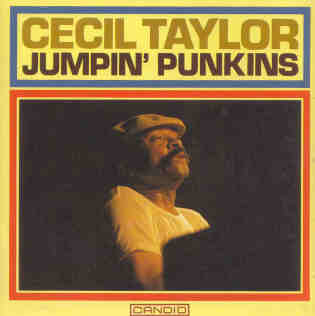
CECIL TAYLOR
Jumpin' Punkins
Candid 9013
Recorded January 1961
1. Jumpin' Punkins
2. O.P.
3. I Forgot
4. Things Ain't What They Used To Be
PERSONNEL
Cecil Taylor: piano;
Archie Shepp: tenor saxophone;
Billy Higgins: drums;
Buell Neidlinger: bass;
Clark Terry: trumpet;
Roswell Rudd: trombone;
Steve Lacy: soprano sax;
Charles Davis: baritone sax
I've always been intrigued by the idea of Cecil Taylor, but have never really known where to start. Like other so-called 'free jazz' artists, the critics are terrified of him, writing about how difficult they find the music, but then handing out 5 star ratings just in case they're missing out on something. Usefully, Cecil recorded several sessions with other jazz giants, notably John Coltrane (recently reissued on Gambit under the title 'Hard Drivin' Jazz'), and here, a young Archie Shepp. In fact it was Taylor who gave Shepp his first big break, and over the time they worked together, Shepp absorbed many of Taylor's musical ideas which he then took forward into his career as leader.
Shepp is not the only outstanding sideman on this album. Steve Lacy's contributions are minimal but excellent - it still amazes me that he went straight from working in a dixieland style to a session with players such as this. Roswell Rudd is excellent as ever, and of all the players here, is probably the only one who really matches Taylor for sheer invention.
Taylor's playing really is the big story on this album. He dominates the recording in a way that few musicians are able to do. It all gets off to an easy start with "Jumpin' Punkins", with it's fairly conventional post bop sound. Cecil's playing is certainly straining at the outer limits of the form, but stays generally well-behaved throughout. Shepp gets significant space here and shows himself to be a competent tenor player, very much in the Coltrane mould, but really nothing special. It's fun to listen to Cecil's solo around the 5 minute mark - a fairly dissonant effort, though not as far out as some of the other tracks on offer here - and then hear Shepp try to follow. It's as if something is holding him back from going totally out. We know from later works how indebted Shepp was to jazz tradition, and perhaps this is the strong pull of the weight of history keeping a young player in check. We can only be thankful that Shepp stayed with Taylor for a little longer, time enough to mature and develop his own unique sound.
"O.P." comes next, and is basically a trio piece with Taylor, Higgins and Neidlinger. Despite the fairly conventional bass and drum introduction, Taylor's playing is in a different league to the title track from the off. He slips quietly into an extended exploration of the possibilities of the keyboard - there is atonality here, he plays often in free time, but yet it all makes sense. The rhythm section keep driving away, and it always seems to fit, no matter how far outside Taylor tries to get. You can understand why critics and fans alike would have been aghast at the time, as this sounds like nothing that had come before in piano playing.
"I Forgot" gives Shepp a chance to shine again, and this time there is a glimmer of the sort of sound that he would be producing on a regular basis just a few years hence. The tone is instantly recognizable, being big and brazen (too much for a ballad, like this?) and his use of overtones is familiar. The second half of the tune is given over to Taylor, until he and Shepp duet towards the end, creating one of the album's finest moments.
The closing "Things Ain't What They Used To Be" gives the whole ensemble a chance to blow again. Taylor initially sounds like he's playing in a different band to the rest of them, but on closer inspection it all fits into place. This track is also where Rudd gets his chance to show off, and follows Taylors lead in playing exactly what he wants to without being limited by traditional jazz constructs. Of course Taylor is ever present, with his unexpected interjections and sharp stabs of dissonance lending an uneasy feel to the piece. The track closes with a brief period of ensemble playing where everyone manages to be totally free yet completely together at the same time.
Remarkable music.
Cecil Taylor Links
The Music Of Cecil Taylor - worth a read if you can stomach unformatted text on a green background
Cecil Taylor Sessionography - this looks to be exhaustive, the level of detail is certainly very high (much higher than the production values, anyway!)
A brief biography - courtesy of Wikipedia


No comments:
Post a Comment